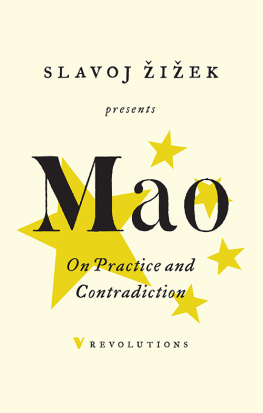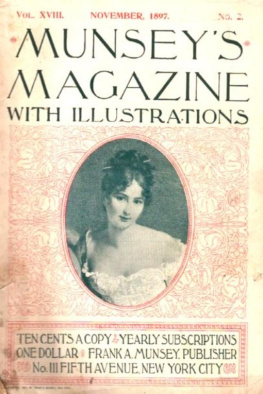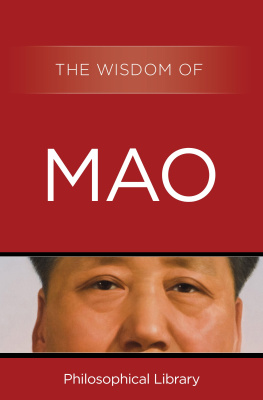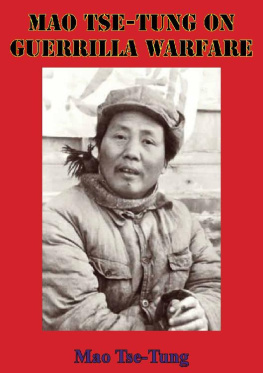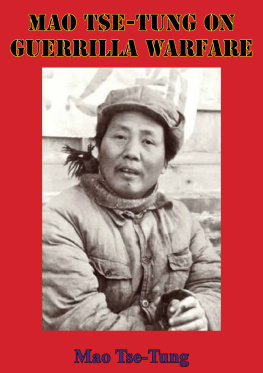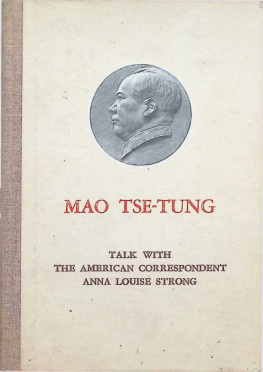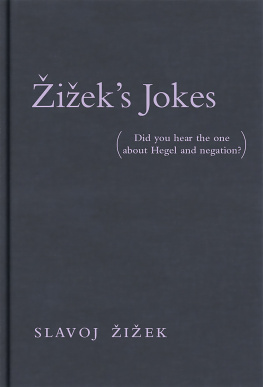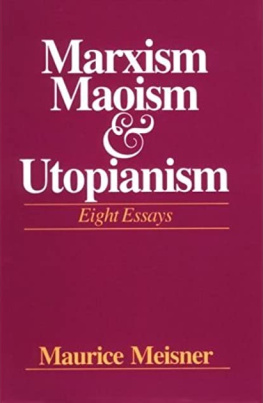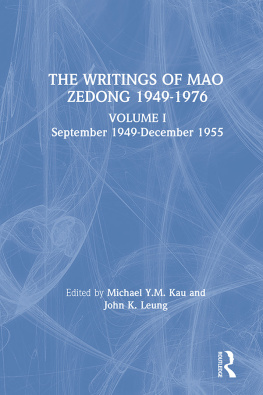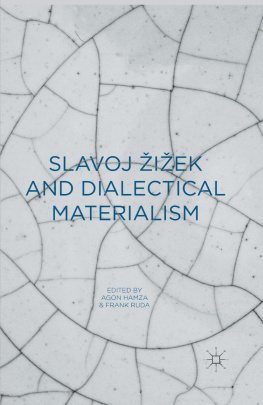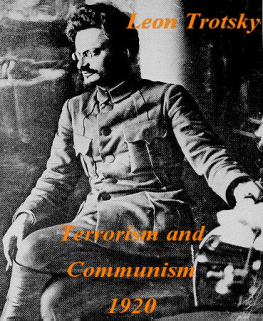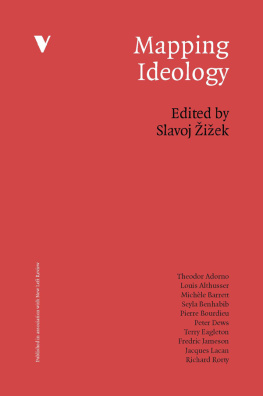A series of classic texts by revolutionaries in both thought and deed.
Each book includes an introduction by a major contemporary writer
illustrating how these figures continue to speak to readers today.
ON PRACTICE
AND CONTRADICTION

MAO ZEDONG
INTRODUCTION BY SLAVOJ IEK

This edition published by Verso 2017
First published by Verso 2007
Introduction Slavoj iek 2007, 2017
published in Selected Works of Mao Zedong,
Foreign Languages Press, Peking 1967; copyright Foreign Languages Press
1967. published in Selected Works of Mao Zedong,
Kranti Publications, Secunderabad 1990; copyright Kranti Publications
1990.
All rights reserved
The moral rights of the authors have been asserted
1 3 5 7 9 10 8 6 4 2
Verso
UK: 6 Meard Street, London W1F 0EG
US: 20 Jay Street, Suite 1010, Brooklyn, NY 11201
versobooks.com
Verso is the imprint of New Left Books
ISBN-13: 978-1-78663-340-8
ISBN-13: 978-1-78663-342-2 (US EBK)
ISBN-13: 978-1-78663-341-5 (UK EBK)
British Library Cataloguing in Publication Data
A catalogue record for this book is available from the British Library
Library of Congress Cataloging-in-Publication Data
Names: Mao, Zedong, 18931976. | Zizek, Slavoj.
Title: On Practice and Contradiction / Mao Tse-Tung ; introduction by Slavoj Zizek.
Description: Brooklyn : Verso, 2017. | Series: Revolutions | Previously published by Verso in 2007.
Identifiers: LCCN 2017024961 | ISBN 9781786633408 (paperback) | ISBN 9781786633422 (US e-book)
Subjects: LCSH: China Politics and government 19491976. | BISAC: HISTORY /
Asia / China. | POLITICAL SCIENCE / Political Ideologies / Communism & Socialism.
Classification: LCC DS777.75 .M3655213 2017 | DDC 335.43/45 dc23 LC record available at https://lccn.loc.gov/2017024961
Typeset in Bembo by Hewer Text UK Ltd, Edinburgh
Printed in the UK by CPI Mackays, UK
CONTENTS
MAO ZEDONG, THE
MARXIST LORD OF MISRULE
One of the most devious traps which lurk in wait for Marxists is the search for the moment of the Fall, when things took the wrong turn in the history of Marxism: was it already the late Engels with his more positivist-evolutionist understanding of historical materialism? Was it the revisionism and the orthodoxy of the Second International? Was it Lenin? Or was it Marx himself in his late work, after he abandoned his youthful humanism (as some humanist Marxists claimed decades ago)? This entire topic has to be rejected: there is no opposition here, the Fall is to be inscribed into the very origins. (To put it even more pointedly, such a search for the intruder who infected the original model and set in motion its degeneration cannot but reproduce the logic of anti-Semitism.) What this means is that, even if or, rather, especially if one submits the Marxist past to a ruthless critique, one has first to acknowledge it as ones own, taking full responsibility for it, not to comfortably get rid of the bad turn of things by way of attributing it to a foreign intruder (the bad Engels who was too stupid to understand Marxs dialectics, the bad Lenin who didnt get the core of Marxs theory, the bad Stalin who spoils the noble plans of the good Lenin, etc.).
The first thing to do, then, is to fully endorse the displacement in the history of Marxism concentrated in two great passages (or, rather, violent cuts): the passage from Marx to Lenin, as well as the passage from Lenin to Mao. In each case, there is a displacement of the original constellation: from the most advanced country (as expected by Marx) to a relatively backward country the revolution took place in a wrong country; from workers to (poor) peasants as the main revolutionary agent, etc. In the same way as Christ needed Pauls betrayal in order for Christianity to emerge as a universal church (recall that, among the twelve apostles, Paul occupies the place of Judas the traitor, replacing him!), Marx needed Lenins betrayal in order to enact the first Marxist revolution: it is an inner necessity of the original teaching to submit to and survive this betrayal, to survive this violent act of being torn out of ones original context and thrown into a foreign landscape where it has to reinvent itself only in this way, universality is born.
So, apropos the second violent transposition, that of Mao, it is too facile either to condemn his reinvention of Marxism as theoretically inadequate, as a regression with regard to Marxs standards (it is easy to show that peasants lack the substanceless proletarian subjectivity), but it is no less inadequate to blur the violence of the cut and to accept Maos reinvention as a logical continuation or application of Marxism (relying, as is usually the case, on the simple metaphoric expansion of class struggle: todays predominant class struggle is no longer between capitalists and proletariat in each country, it has shifted to the Third versus the First World, bourgeois versus proletarian nations). The achievement of Mao is here tremendous: his name stands for the political mobilization of the hundreds of millions of anonymous Third World toilers whose labour provides the invisible substance, background, of historical development the mobilization of all those whom even such a poet of otherness as Lvinas dismissed as the yellow peril see, from what is arguably his weirdest text, The Russo-Chinese Debate and the Dialectic (1960), a comment on the Soviet-Chinese conflict:
The yellow peril! It is not racial, it is spiritual. It does not involve inferior values; it involves a radical strangeness, a stranger to the weight of its past, from where there does not filter any familiar voice or inflection, a lunar or Martian past.
Does this not recall Heideggers insistence, throughout the 1930s, that the main task of Western thought today is to defend the Greek breakthrough, the founding gesture of the West, the overcoming of the pre-philosophical, mythical, Asiatic universe, to struggle against the renewed Asiatic threat the greatest antagonist of the West is the mythical in general and the Asiatic in particular? It is this Asiatic radical strangeness which is mobilized, politicized, by Mao Zedongs communist movement.
In his Phenomenology of Spirit, Hegel introduces his notorious notion of womankind as the everlasting irony of the community: womankind
changes by intrigue the universal end of the government into a private end, transforms its universal activity into a work of some particular individual, and perverts the universal property of the state into a possession and ornament for the family.
In contrast to male ambition, a woman wants power in order to promote her own narrow family interests or, even worse, her personal caprice, incapable as she is of perceiving the universal dimension of state politics. How are we not to recall F. W. J. Schellings claim that the same principle carries and holds us in its ineffectiveness which would consume and destroy us in its effectiveness? A power which, when it is kept at its proper place, can be benign and pacifying, turns into its radical opposite, into the most destructive fury, the moment it intervenes at a higher level, the level which is not its own:

